[ad_1]
If you need commercial flooring for your business or home, you might be considering commercial carpet. High traffic carpet is a low-pile, durable flooring option that won’t stain easily, but is it the right choice for you?
This in-depth guide can help you make a decision! Commercial settings like stores, lobbies, and businesses have all benefited from the durability and style of heavy-duty carpet. It won’t get matted down or worn-looking even after lots of use.
Keep reading to learn about the different types of commercial-grade carpet, the pros and cons, how to install it, and a whole lot more.
| Related Content >> The Ultimate Carpet Buying Guide |
What is Commercial Carpet?
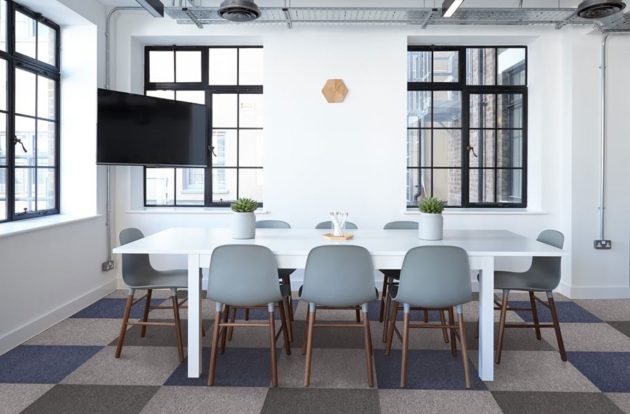
Commercial carpets are ultra-durable carpets designed for heavy traffic, stain resistance, and easy maintenance. They’re typically Berber, which means the fibers are looped through the carpet backing, making them less soft but more durable.
Commercially-rated carpets have a lower pile, meaning they are thinner. This allows the carpet to hold up to wear and tear without matting or crushing.
Industrial carpet comes in a variety of patterns and colors to fit your commercial space. They’re perfect for retail entryways, grocery stores, airports, banks, commercial gyms and offices, and even your home!
About Carpet Fibers
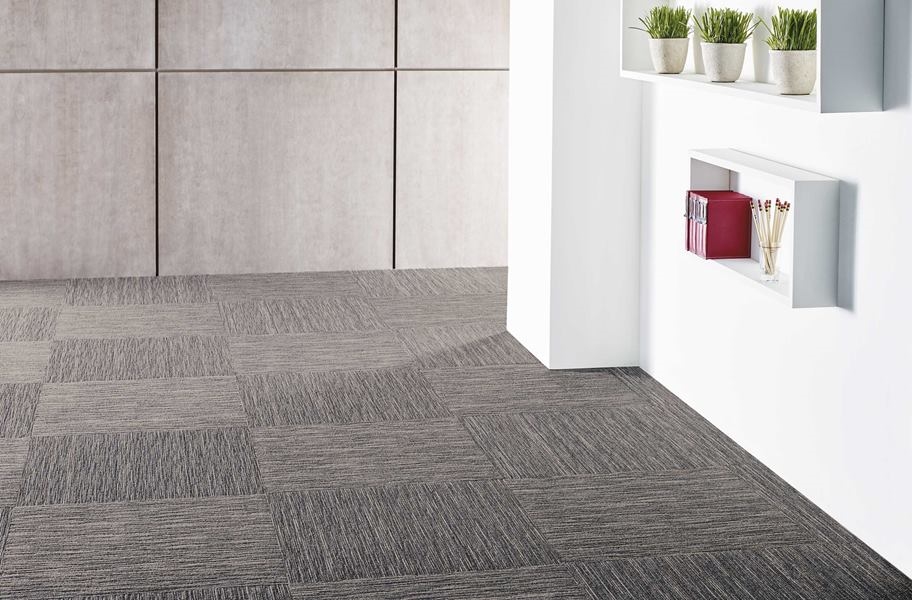
- Nylon: This is a popular choice for inside commercial buildings, condos, and apartments. Often chosen for its safety with indoor applications because it meets fire codes since it doesn’t burn – it melts. However, it fades in the sun, so avoid outdoor use.
- Polyester: Polyester or “PET” is typically a lower cost than nylon, and it works in both indoor and outdoor applications. This durable fiber resists water and staining, which makes it great for any use in the home and even in commercial spaces.
- Polypropylene: These fibers are cheaper than others, but they still hold up very well in high-traffic areas. You can find polypropylene fiber in places like grocery stores or office lobbies. It resists mold and mildew, but it stains more easily than the others.
About Carpet Thickness
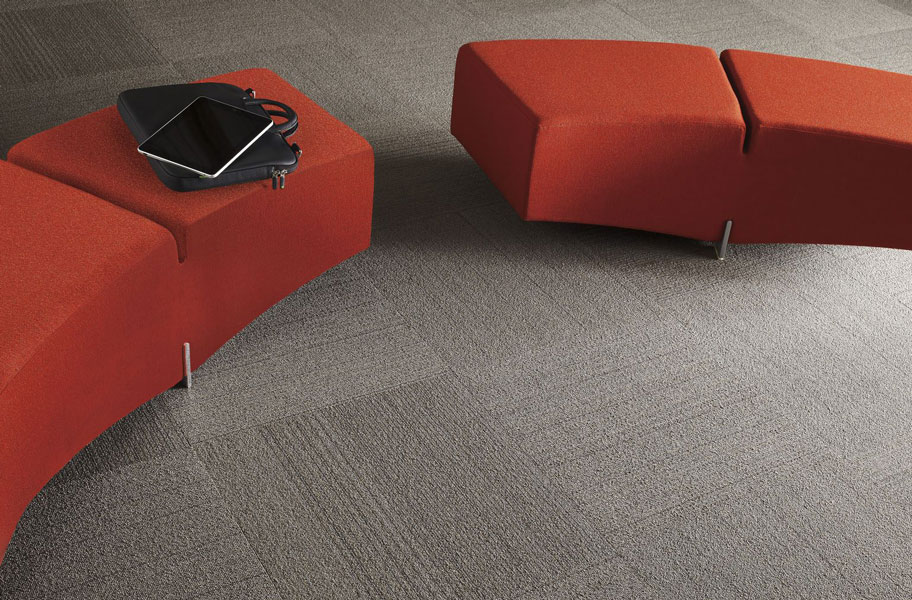
While residential carpet is thick and plush, commercial carpet is the opposite. The fibers are short and dense, creating a heavy-duty carpet that resists crushing and denting. Low-pile carpet is built for heavy foot traffic and tons of wear, but it sacrifices comfort for all that durability.
Commercial Carpet Traffic Ratings
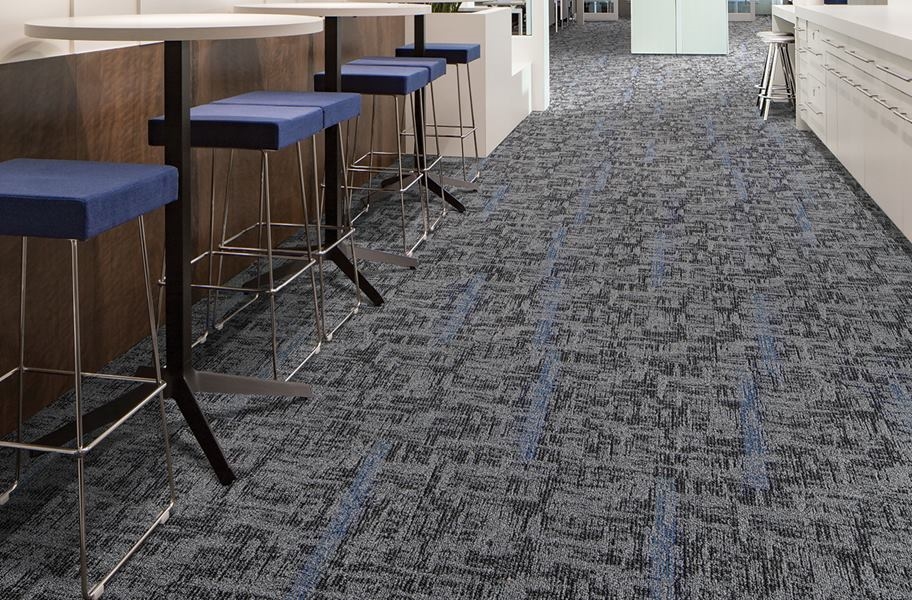
Some commercial carpets are designed to handle more foot traffic than others. Check out the ratings to find the best durability for you.
- Walk-off: This is the ultimate durable carpet designed for entryways and even garages.
- Extra heavy: The toughest of the tough, this carpet can handle the busiest areas.
- Medium: Great for use in spaces with a lot of foot traffic.
- High: Designed specifically for heavy foot traffic and busier areas.
Types of Commercial Carpet
You might think that all commercial carpets are the same, but the truth is that you have a lot of options! Explore the different varieties to discover which works best for you.
Commercial Carpet Tiles
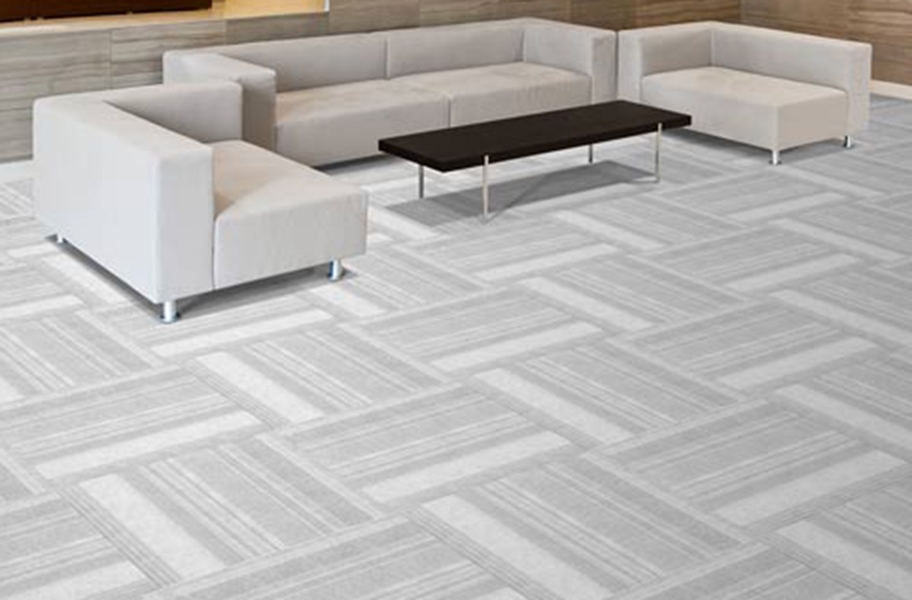
Commercial carpet tiles are so easy to install that you can often complete installation on your own in a matter of hours. With carpet tiles, you can create custom patterns using different colors.
It’s also very easy to replace carpet squares if they become stained or damaged. Simply lift the affected tile and replace it with a new one.
Shop Commercial Carpet Tiles
Commercial Carpet Planks
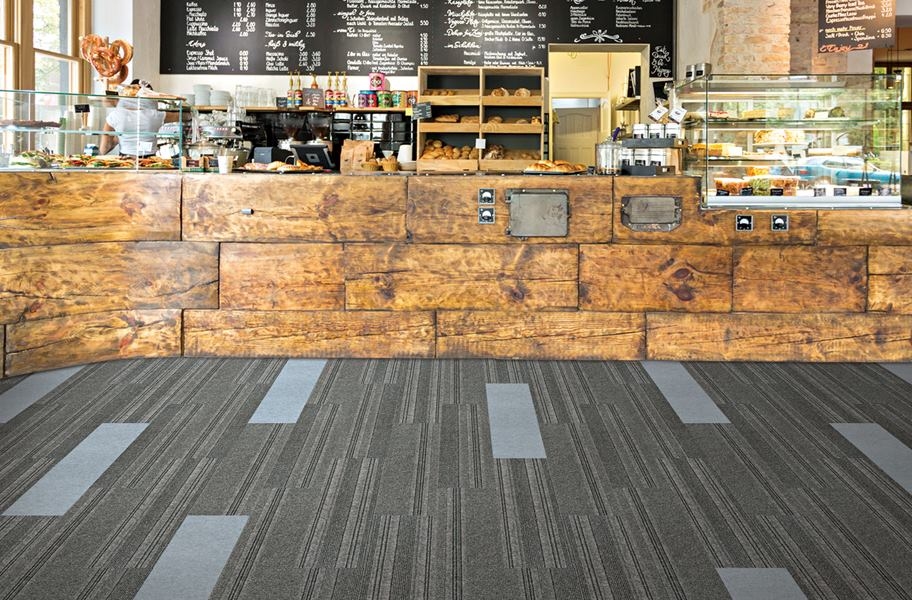
Carpet planks are similar to carpet tiles in many ways, including easy installation. With the longer plank shape, you can get more creative with your design.
Use carpet planks to create herringbone patterns in your commercial space, or experiment with other modern, geometric designs.
Shop Commercial Carpet Planks
Commercial Carpet Rolls
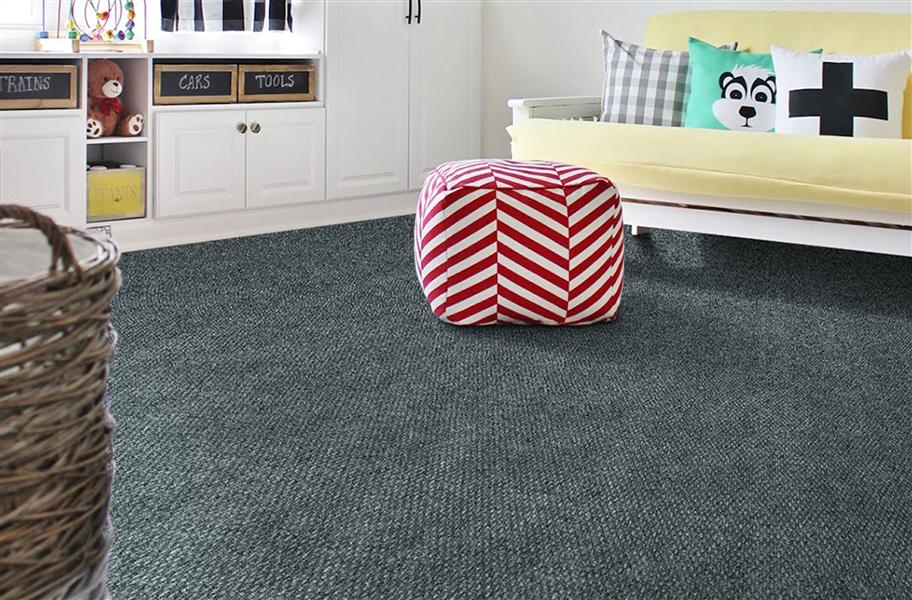
Traditional broadloom carpet rolls still make up the majority of the carpet industry. Carpet rolls are typically priced cheaper per square foot than tiles or planks since they cover a larger area.
This makes broadloom a great choice for budget-friendly projects as well as larger jobs where you need to cover a lot of square footage.
Shop Commercial Carpet Rolls
| Related Content >> Carpet FAQ: Get the Facts |
Pros and Cons of Commercial Carpet
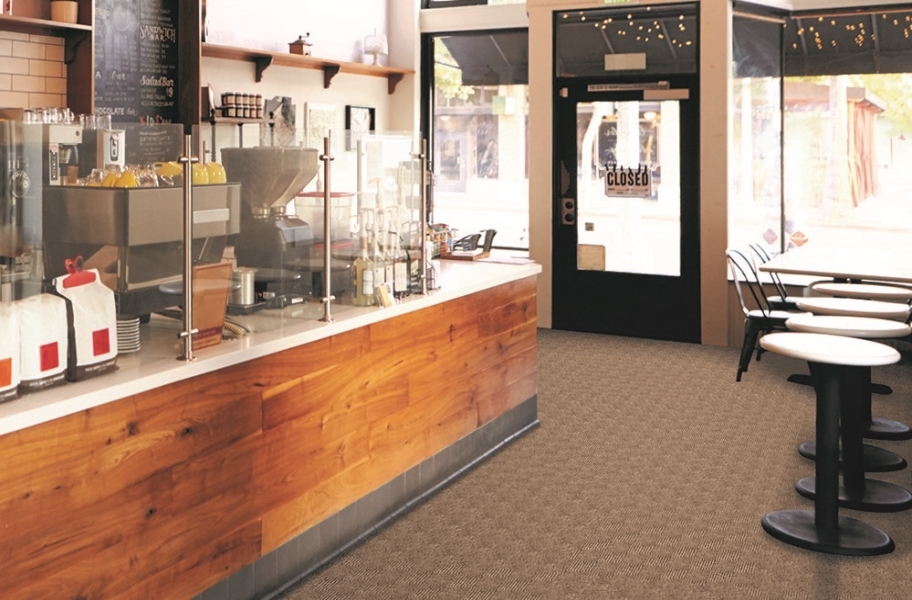
If you’re still not sure if carpeting is the best solution for your commercial space, consider the pros and cons. Learning about the benefits and potential drawbacks will help you make a decision.
Pros
- Durability: The tough fibers and dense, low pile ensure that your floor can handle heavy traffic.
- Price: For budget-conscious buyers, carpet is the perfect commercial flooring option. It’s durable and stylish, all without breaking the bank.
- Maintenance: Low-pile, stain-resistant carpet is a breeze to clean. Just make sure to vacuum regularly, and your floor will look great for years to come.
- Installation: Self-adhesive carpet tiles are designed for quick and easy installation.
Cons
- Comfort: It’s designed for durability, and isn’t as plush and comfortable as regular residential carpet.
- Installation: Yes, this is a pro and a con, depending on the product. Not all carpet is designed for peel and stick installation. For really high-traffic areas, you’ll need to glue down the carpet, and that’s best left to a professional.
How to Install Commercial Carpet
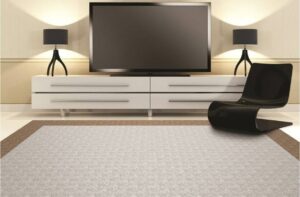
The ease of installing carpet depends on where you’re putting it, and the type of carpet you choose. If you’re going to install carpet tiles in your home, then it’s a simple DIY project. But if you need carpet rolls in a high-traffic business, you may want to hire a professional.
How to Install Carpet Tiles
When you want something easy to install, carpet tiles are the way to go. There are two main ways to install it: tape-down/peel and stick installation or glue-down installation.
Peel and Stick or Tape Installation
Peel and stick tiles are the easiest way to install carpet. The adhesive is pre-applied to each tile and all you have to do is pull back the plastic. You can also use double-sided carpet tape if the adhesive isn’t already applied.
From there, simply place the carpet on the floor, and press down to make sure it sticks.
Glue Down Installation
For commercial areas with lots of traffic, you should glue down the carpet for more stability. Use a pressure-sensitive adhesive for a more permanent hold. This project is often best-suited for professionals, but if you want to DIY your floor, you can apply the adhesive yourself. Always make sure to check the manufacturer to find more detailed installation instructions.
How to Install Carpet Rolls
Installing carpet rolls requires the glue-down method to keep them stable. Apply the adhesive onto the floor, and then roll the carpet into the adhesive using the carpet core or the flat end of a push broom. Then you just have to wait for the adhesive to cure before you can walk over the floor. Again, check the manufacturer for detailed installation instructions.
| Related Content >> How to Install Carpet Yourself: 3 DIY-Friendly Options |
How to Clean Commercial Carpet
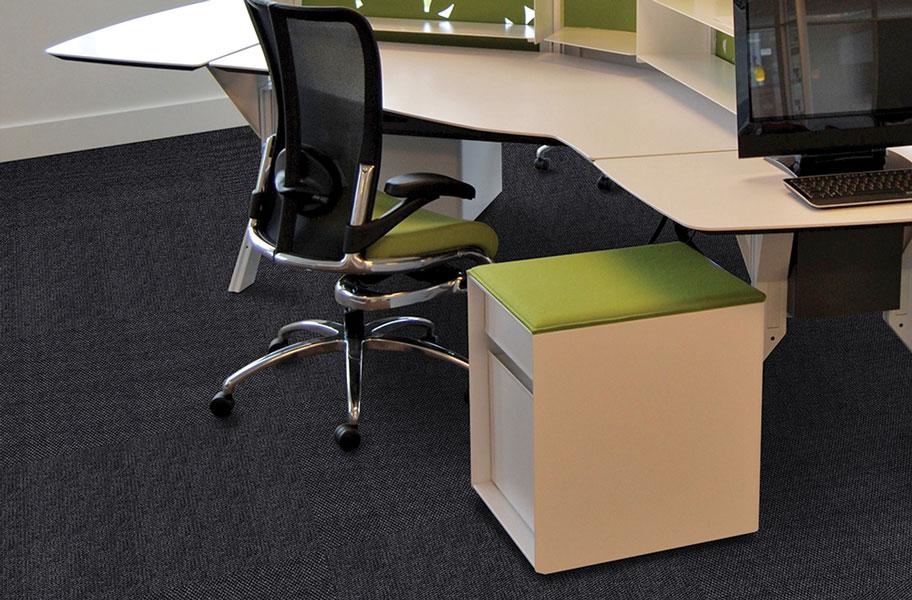
Commercial carpet doesn’t require special equipment to keep it looking fresh and new. Maintaining your carpet tiles is as easy as this:
- Vacuum frequently to keep your floor clean and inviting.
- Remove spills immediately with an absorbent cotton cloth and clean water.
- Occasionally deep clean using a hot water extraction-cleaning machine (i.e. carpet cleaner).
To spot clean carpet and remove stains, follow these tips:
- Spray your favorite carpet cleaner over a small area and let it sit for 5-10 minutes.
- Dab the stain with a clean towel.
- Once the stain has vanished, rinse the area with clean water.
- Soak up the remaining moisture with a second clean towel to finish up.
| Related Content >> How to Clean Carpet: 10 Tips to Maintain Your Carpet and Prevent Stains |
Carpet FAQ
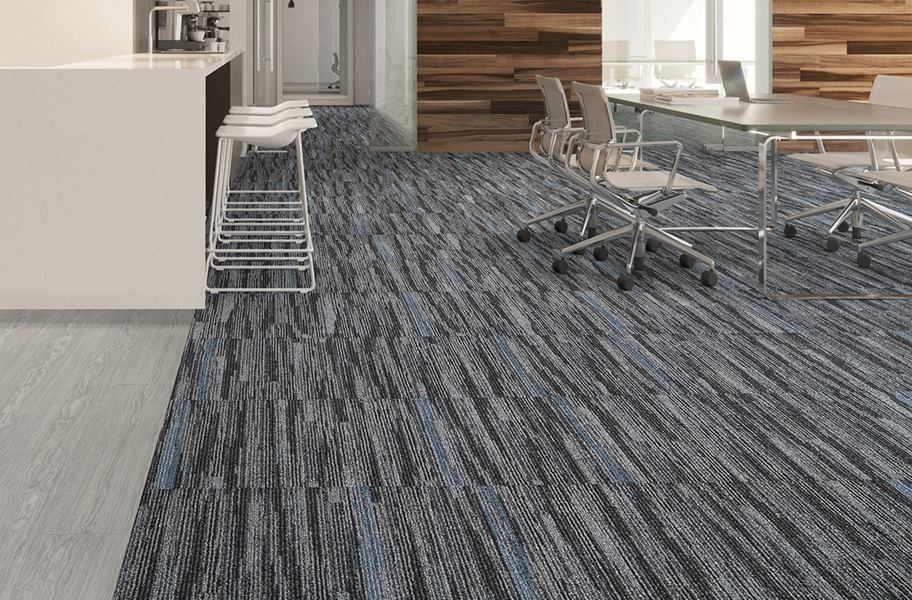
Still have some questions? We have the answers!
What type of carpet is best for commercial use?
Low-pile nylon carpet is best for commercial use because the durable fiber can handle heavy traffic without matting or getting crushed. It’s also stain-resistant and easier to keep clean, which is important in larger commercial spaces where intense maintenance would be a hassle. We recommend carpet with looped fibers, like Berber, because this construction makes the carpet even stronger.
What’s the difference between commercial and residential carpet?
Residential carpets are designed to be plush and comfortable, while commercial carpet is more durable. The carpet in your home usually has a higher pile and softer fibers than commercial flooring. Commercial carpets is more rough and dense, so it can withstand heavy traffic, stains, and more.
Is commercial carpet more expensive?
Commercial carpet is typically less expensive than thick, plush residential carpet. The price can vary depending on the features of the carpet, but as a whole, you can expect it to have a lower cost per square foot than the carpet in your home.
Does commercial carpet need padding?
Commercial carpet doesn’t always need padding. However, you can still benefit from carpet padding if you choose the right option. Rubber roll underlayment provides the best padding because it’s durable and not too soft.
Can professional carpet cleaners remove pet stains?
Yes, professional carpet cleaners are the most effective choice in removing difficult pet stains! The best cleaning formula to get out pet stains we found is the Bissell Pet Pro Oxy Urine Eliminator Formula, to remove stains at their source.
Additionally, for at-home solutions, we recommend you avoid cleaning chemicals like vinegar or ammonia. Strong scents like these can potentially encourage your pets to make another stain in the same area.
Where can I purchase commercial carpet cleaner?
You can purchase commercial carpet cleaners at everyday retail stores like Ace Hardware, Walmart, Kohls, and Office Depot.
Looking for a professional cleaning machine to go with? Check out this guide to the Best Commercial Carpet Cleaning Machines.
| Related Content >> This Year’s Best Carpet Trends |
Conclusion
Now you know everything you need to find the perfect commercial carpet for your space. Whether you want something extra durable for your busy home or stylish flooring for your business, this durable carpet has got you covered.
If you’re ready to explore your commercial carpet options, why not start with some free samples?
Order Free Samples Shop All Commercial Carpet
The post Commercial Carpet Buying Guide: What You Should Know appeared first on Flooring Inc.
[ad_2]
www.flooringinc.com










